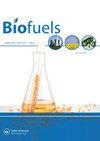水解过程中添加尿素提高白甘薯乙醇产量:一种有前景的策略
IF 2.6
4区 工程技术
Q3 ENERGY & FUELS
引用次数: 0
摘要
本文章由计算机程序翻译,如有差异,请以英文原文为准。
Urea addition during hydrolysis for increased ethanol yield from white sweet potato: a promising strategy
Abstract Bioethanol is mainly produced from corn worldwide, but many countries face challenges in producing sufficient corn for this purpose. White sweet potato (Ipomoea batatas Linneaus) has a lower nutritional value and less carotene pigment compared to other sweet potatoes, which may make it less desirable as a food source in some regions. However, the affordability of white sweet potato could make it an attractive option for bioethanol production in areas where corn is not readily available. This study investigated the use of white sweet potatoes powder (40 mesh sieve) as a feedstock for ethanol production using Saccharomyces cerevisiae yeast. Optimization of the fermentation process was carried out using response surface methodology (RSM). Results showed that an ethanol yield of 18% could be achieved by applying pH at 4.5 and urea concentration of 60 mg/L. These findings suggest that the addition of urea during hydrolysis of white sweet potato is a promising alternative method for bioethanol production which contained higher etnaol yield compated to the previous finding that utilized amyloglucosidase enzyme during hydrolysis.
求助全文
通过发布文献求助,成功后即可免费获取论文全文。
去求助
来源期刊

Biofuels-Uk
Energy-Renewable Energy, Sustainability and the Environment
CiteScore
5.40
自引率
9.50%
发文量
56
期刊介绍:
Current energy systems need a vast transformation to meet the key demands of the 21st century: reduced environmental impact, economic viability and efficiency. An essential part of this energy revolution is bioenergy.
The movement towards widespread implementation of first generation biofuels is still in its infancy, requiring continued evaluation and improvement to be fully realised. Problems with current bioenergy strategies, for example competition over land use for food crops, do not yet have satisfactory solutions. The second generation of biofuels, based around cellulosic ethanol, are now in development and are opening up new possibilities for future energy generation. Recent advances in genetics have pioneered research into designer fuels and sources such as algae have been revealed as untapped bioenergy resources.
As global energy requirements change and grow, it is crucial that all aspects of the bioenergy production process are streamlined and improved, from the design of more efficient biorefineries to research into biohydrogen as an energy carrier. Current energy infrastructures need to be adapted and changed to fulfil the promises of biomass for power generation.
Biofuels provides a forum for all stakeholders in the bioenergy sector, featuring review articles, original research, commentaries, news, research and development spotlights, interviews with key opinion leaders and much more, with a view to establishing an international community of bioenergy communication.
As biofuel research continues at an unprecedented rate, the development of new feedstocks and improvements in bioenergy production processes provide the key to the transformation of biomass into a global energy resource. With the twin threats of climate change and depleted fossil fuel reserves looming, it is vitally important that research communities are mobilized to fully realize the potential of bioenergy.
 求助内容:
求助内容: 应助结果提醒方式:
应助结果提醒方式:


